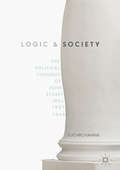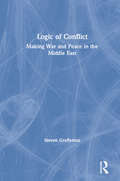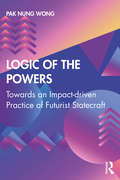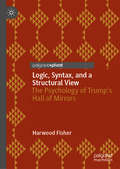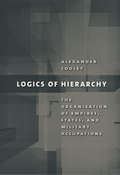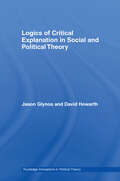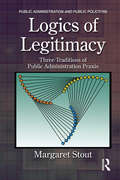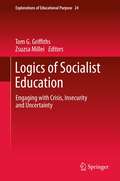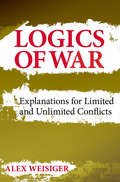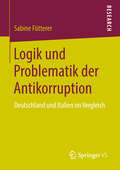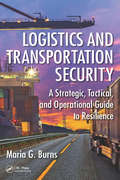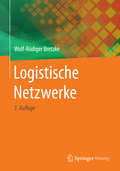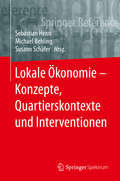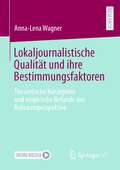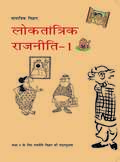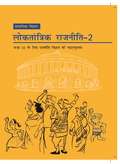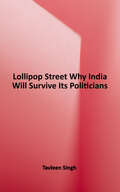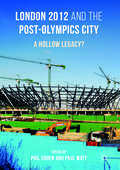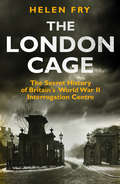- Table View
- List View
Logic and Society: The Political Thought of John Stuart Mill, 1827-1848
by Yuichiro KawanaThis book discusses John Stuart Mill’s intellectual activity from about 1827 to 1848, namely between his recovery from his so-called ‘Mental Crisis’ and the publication of Principles of Political Economy. During this period, along with deepening his understanding of contemporary society as commercial civilization, Mill aspired to create a new system of science of society which would inquire into the nature, process of historical change, and prospects of society. Among the indispensable constituent sciences of his system, this book pays particular attention on his projected sciences of history and of the formation of character (ethology), and clarifies that the implications of his interest in these sciences were more significant for the better understanding of Mill’s political thought than many scholars have assumed.
Logic of Conflict: Making War and Peace in the Middle East
by Steven GreffeniusThe author’s argument ties this literature to a field that is often called the logic of inquiry. He criticizes an influential and deliberately analytical approach to the study of international conflict and show what can be gained by bringing more integrative or synthetic approaches to bear on problems in the field. The study started as an effort to work out some problems in international relations theory and it has remained that through eight years of writing and research. Still, the book is more than incidentally about the Middle East, and evidence from the region informs the argument made here. This evidence is of two kinds: traditional historical material from both primary and secondary sources, and data on events that have occurred during the course of both conflictual and cooperative exchanges between the actors there. The treatment focuses on the relationship between Egypt and Israel between 1967 and 1979, a period that saw their relations pass from the most intense antagonism to a reasonable degree of comity if not friendship.
Logic of the Powers: Towards an Impact-driven Practice of Futurist Statecraft
by Pak Nung WongWhat global future would ensure hope, justice and peace to the human mankind? In view of a fast evolving post-Covid world order, this volume explores a novel Christian post-colonial approach to global affairs. It examines the existing ‘sociology of the powers’ theoretical scheme, the debate between Christian realism and Christian pacifism, the method and practice of prophetic witnessing, to elaborate a new Christian approach to statecraft and futurology in terms of theory, methodology and ontology. This book: • Uses the COVID-19 pandemic as the background to examine why and how the pandemic has accelerated the US’s decline, and to identify the tacit game rules that contributed to the UK government’s mishandling of the pandemic; • Compares the political systems between China and the West, and engages with selected theoretical narratives from the Global South to envision an alternative ‘shared globalisation’ project; • Argues why it is important for post-colonial Christian individuals and communities to get involved in this global discussion for a new world order of complex realist interdependencies grounded on hope, social justice and peace. A fresh take on global politics and international relations, this volume will be of great interest to scholars and researchers of political science, religious studies, peace studies, theology and future studies.
Logic, Syntax, and a Structural View: The Psychology of Trump's Hall of Mirrors
by Harwood FisherThis book presents a new structural approach to the psychology of the person, inspired by Kenneth Colby’s computer-generated simulation, PARRY. The simulation was of a paranoid psychological state, represented in forms of the person's logic and syntax, as these would be evidenced in personal communication. Harwood Fisher uses a Structural View to highlight similarities in the logical form of the linguistic representations of Donald Trump, his avid followers (“Trumpers”), and the paranoid—referred to as “The Trio.” He demonstrates how the Structural View forms a series of logical and schematic patterns, similar to the way that content analysis can bring forth associations meanings, and concepts held in the text. Such comparisons, Fisher argues, can be used to shed light on contingencies for presenting, representing, and judging truth. Specifically, Fisher posits that the major syntactic and logical patterns that were used to produce the computer-generated “paranoid” responses in Colby’s project can be used to analyze Donald Trump’s rhetoric and his followers’ reactions to it. Ultimately, Fisher offers a new kind of structural approach for the philosophy of psychology. This novel work will appeal to students and scholars of social and cognitive psychology, psychology of personality, psychiatric classification, psycholinguistics, rhetoric, and computer science.
Logics Of Hierarchy: The Organization of Empires, States, and Military Occupations
by Alexander CooleyPolitical science has had trouble generating models that unify the study of the formation and consolidation of various types of states and empires. The business-administration literature, however, has long experience in observing organizations. According to a dominant model in this field, business firms generally take one of two forms: unitary (U) or multidivisional (M). The U-form organizes its various elements along the lines of administrative functions, whereas the M-form governs its periphery according to geography and territory. In Logics of Hierarchy, Alexander Cooley applies this model to political hierarchies across different cultures, geographical settings, and historical eras to explain a variety of seemingly disparate processes: state formation, imperial governance, and territorial occupation. Cooley illustrates the power of this formal distinction with detailed accounts of the experiences of Central Asian republics in the Soviet and post-Soviet eras, and compares them to developments in the former Yugoslavia, the governance of modern European empires, Korea during and after Japanese occupation, and the recent U. S. occupation of Iraq. In applying this model, Logics of Hierarchy reveals the varying organizational ability of powerful states to promote institutional transformation in their political peripheries and the consequences of these formations in determining pathways of postimperial extrication and state-building. Its focus on the common organizational problems of hierarchical polities challenges much of the received wisdom about imperialism and postimperialism.
Logics of Critical Explanation in Social and Political Theory (Routledge Innovations in Political Theory #Vol. 26)
by David Howarth Jason GlynosThis book proposes a novel approach to practising social and political analysis based on the role of logics. The authors articulate a distinctive perspective on social science explanation that avoids the problems of scientism and subjectivism by steering a careful course between lawlike explanations and thick descriptions. Drawing upon hermeneutics, poststructuralism, psychoanalysis, and post-analytical philosophy, this new approach offers a particular set of logics – social, political and fantasmatic – with which to construct critical explanations of practices and regimes. While the first part of the book critically engages with lawlike, interpretivist and causal approaches to critical explanation, the second part elaborates an alternative grammar of concepts informed by an ontological stance rooted in poststructuralist theory. In developing this approach, a number of empirical cases are included to illustrate its basic concepts and logics, ranging from the apartheid regime in South Africa to recent changes in higher education. The book will be a valuable tool for scholars and researchers in a variety of related fields of study in the social sciences, especially the disciplines of political science and political theory, international relations, social theory, cultural studies, anthropology and philosophy.
Logics of Legitimacy: Three Traditions of Public Administration Praxis (Public Administration and Public Policy #167)
by Margaret StoutThe discipline of public administration draws predominantly from political and organizational theory, but also from other social and behavioral sciences, philosophy, and even theology. This diversity results in conflicting prescriptions for the "proper" administrative role. So, how are those new to public administration to know which ideas are "legitimate"? Rather than accepting conventional arguments for administrative legitimacy through delegated constitutional authority or expertise, Logics of Legitimacy: Three Traditions of Public Administration Praxis does not assume that any one approach to professionalism is accepted by all scholars, practitioners, citizens, or elected representatives. Instead, it offers a framework for public administration theory and practice that fully includes the citizen as a political actor alongside elected representatives and administrators. This framework: Considers both direct and representative forms of democracy Examines concepts from both political and organizational theory, addressing many of the key questions in public administration Examines past and present approaches to administration Presents a conceptual lens for understanding public administration theory and explaining different administrative roles and practices The framework for public administration theory and practice is presented in three traditions of main prescriptions for practice: Constitutional (the bureaucrat), Discretionary (the entrepreneur), and Collaborative (the steward). This book is appropriate for use in graduate-level courses that explore the philosophical, historical, and intellectual foundations of public administration. Upon qualified course adoption, instructors will gain access to a course outline and corresponding lecture slides.
Logics of Socialist Education
by Zsuzsa Millei Tom G. GriffithsFor some, socialism is a potent way of achieving economic, political and social transformations in the twenty-first century, while others find the very term socialism outdated. This book engages readers in a discussion about the viability of socialist views on education and identifies the capacity of some socialist ideas to address a range of widely recognized social ills. It argues that these pervasive social problems, which plague so-called 'developed' societies as much as they contribute to the poverty, humiliation and lack of prospects in the rest of the world, fundamentally challenge us to act. In our contemporary world-system, distancing ourselves from the injustices of others is neither viable nor defensible. Rather than waiting for radically new solutions to emerge, this book sees the possibility of transformation in the reconfiguration of existing social logics that comprise our modern societies, including logics of socialism. The book presents case studies that offer a critical examination of education in contemporary socialist contexts, as well as reconsidering examples of education under historical socialism. In charting these alternatives, and retooling past solutions in a nuanced way, it sets out compelling evidence that it is possible to think and act in ways that depart from today's dominant educational paradigm. It offers contemporary policy makers, researchers, and practitioners a cogent demonstration of the contemporary utility of educational ideas and solutions associated with socialism. A pioneering collection of essays which is central to understanding the historical and contemporary meanings of socialism in the context of neoliberal globalization. It is a most timely contribution to a growing intellectual project that challenges the hegemony of capitalism, while re-thinking and theorizing alternatives. Iveta Silova, Associate Professor of Comparative Education, Lehigh University, Bethlehem, PA, USA In this significant contribution to recent scholarship the authors use the lens of socialist education to offer an original critique of hegemonic capitalism, and present an intellectually rigorous search for alternatives by reconsidering historical socialism and advancing promising educational experiments that challenge the 'global architecture of education'. Anders Breidlid, Professor of International Education and Development, Oslo University College, Norway
Logics of War: Explanations for Limited and Unlimited Conflicts
by Alex WeisigerMost wars between countries end quickly and at relatively low cost. The few in which high-intensity fighting continues for years bring about a disproportionate amount of death and suffering. What separates these few unusually long and intense wars from the many conflicts that are far less destructive? In Logics of War, Alex Weisiger tests three explanations for a nation's decision to go to war and continue fighting regardless of the costs. He combines sharp statistical analysis of interstate wars over the past two centuries with nine narrative case studies. He examines both well-known conflicts like World War II and the Persian Gulf War, as well as unfamiliar ones such as the 1864-1870 Paraguayan War (or the War of the Triple Alliance), which proportionally caused more deaths than any other war in modern history. When leaders go to war expecting easy victory, events usually correct their misperceptions quickly and with fairly low casualties, thereby setting the stage for a negotiated agreement. A second explanation involves motives born of domestic politics; as war becomes more intense, however, leaders are increasingly constrained in their ability to continue the fighting. Particularly destructive wars instead arise from mistrust of an opponent's intentions. Countries that launch preventive wars to forestall expected decline tend to have particularly ambitious war aims that they hold to even when fighting goes poorly. Moreover, in some cases, their opponents interpret the preventive attack as evidence of a dispositional commitment to aggression, resulting in the rejection of any form of negotiation and a demand for unconditional surrender. Weisiger's treatment of a topic of central concern to scholars of major wars will also be read with great interest by military historians, political psychologists, and sociologists.
Logik und Problematik der Antikorruption
by Sabine FüttererKorruption wird meist mit undemokratischen Staaten in Verbindung gebracht. Dass das Phänomen jedoch auch in konsolidierten westlichen Demokratien aufzutreten vermag, wo korrupte Verhaltensweisen aufgrund des herrschenden Selbstverständnisses einer modernen politischen Kultur dem demokratischen Grundkonsens entgegenstehen, belegen empirische Befunde. Vor diesem Hintergrund charakterisiert die Autorin Korruption und Antikorruption und legt eine Abgrenzung zwischen unterschiedlichen Ebenen, Sektoren und Reichweiten vor. Sie geht der Frage nach, inwieweit Antikorruption funktional gewählt ist und zeigt, wie diese auf Eigenschaften und Prämissen westlicher Demokratien abgestimmt werden kann, um Korruption langfristig zu minimieren.
Logistics and Transportation Security: A Strategic, Tactical, and Operational Guide to Resilience
by Maria G. Burns"Professor Burns has captured the essence of transportation security, one of today's most pressing concerns. As the rate of globalization and world trade increases, security and supply chain resilience are at the core of one‘s global transportation network. This is a timely and well written contribution to the industry." John A. Moseley, Senior Dir
Logistische Netzwerke
by Wolf-Rüdiger BretzkeDer Autor stellt industriespezifische und branchenübergreifende logistische Designprinzipien für erfolgreiche Netzmodelle in den Bereichen Industrie, Handel und Transportdienstleistung vor. Für die 2. Auflage wurde u. a. die Analyse zum Thema Nachhaltigkeit vertieft, der Autor hat außerdem mit zusätzlichen Fallbeispielen und Schaubildern die Verständlichkeit verbessert und widmet den methodologischen Grundlagen jetzt ein eigenes Kapitel. Dadurch werden Wissenschaft und Praxis noch stärker miteinander verzahnt.
Logos, Tao und Ereignis: Martin Heidegger und das zukünftige Denken (Persönlichkeit und weltpolitische Gestaltung)
by Sun ZhouxingDie Begriffe Logos, Tao und Ereignis stehen im Zentrum dieser Aufsatzsammlung, die sich auf das künftige Denken im Ausgang von Martin Heideggers Philosophie unter der Voraussetzung der Geschichtlichkeit des Seins und unter Einbezug der multikulturellen Ressourcen der Menschheit bezieht. Unter den philosophischen Diskursen des 20. Jahrhunderts ist Heideggers Ereignis wahrscheinlich das rätselhafteste. Der Autor hat diese acht Aufsätze, die erstmals in deutscher Sprache erscheinen, auf verschiedene Art und Weise überarbeitet, erweitert und verbessert sowie inhaltlich und formal vereinheitlicht. So erhält eine Heidegger-Interpretation aus chinesischer Perspektive Eingang in die Wirkungs- und Rezeptionsgeschichte des deutschen Philosophen.
Lokal verankerte Zivile Konfliktbearbeitung zwischen Partnerschaft und Machtungleichgewicht (Studien des Leibniz-Instituts Hessische Stiftung Friedens- und Konfliktforschung)
by Samantha RuppelIn diesem Open-Access-Buch werden Prozesse und Dynamiken der Zusammenarbeit zwischen verschiedenen Akteur*innen in Projekten des zivilen Friedensdienstes in Kenia, Sierra Leone und Liberia betrachtet. Das durch lokale und internationale Akteur*innen gemeinsame Bearbeiten von Konflikten und Herausforderungen der Friedenskonsolidierung hat in der deutschen Friedensarbeit eine lange Tradition und wird in einer globalisierten Welt immer wichtiger. Deswegen geht das Buch der sowohl für die Wissenschaft als auch für die Friedenspraxis relevanten Frage nach, inwiefern im Kontext der Zivilen Konfliktbearbeitung eine gleichberechtige Partnerschaft vorliegen kann. Indem sich die Arbeit auf die Chancen und Herausforderungen der Zusammenarbeit konzentriert, gelingt es, den Blick auf die alltäglichen Aktivitäten zu legen, die eigentlichen Prozesse und Reibungspunkte der Friedensarbeit zu analysieren und einen wertvollen Beitrag zur kritischen Friedensforschung und der Diskussion um Hybridität und Friction zu leisten.
Lokale Ökonomie – Konzepte, Quartierskontexte und Interventionen
by Sebastian Henn Michael Behling Susann SchäferDas vorliegende Handbuch bietet einen umfassenden systematischen Überblick über das Themenfeld Lokale Ökonomie in Bezug auf Konzepte, Quartierskontexte und Interventionen. In prägnanten Kurzkapiteln diskutieren Wissenschaftler aus unterschiedlichen Disziplinen (Humangeographie, Soziologie, Wirtschaftswissenschaften etc.) sowie Akteure aus der Stadtentwicklungspraxis grundlegende Konzepte der lokalen Ökonomie und verwandte Ansätze, Dynamiken und Prozesse in unterschiedlichen Quartieren sowie Gestaltungsoptionen zur Stärkung lokal-ökonomischer Strukturen in Deutschland. Das Handbuch richtet sich gleichermaßen an Studierende, Wissenschaftler und Praktiker aus der integrierten Stadt- und Quartiersentwicklung.
Lokaljournalistische Qualität und ihre Bestimmungsfaktoren: Theoretische Konzeption und empirische Befunde aus Nahraumperspektive
by Anna-Lena WagnerAnna-Lena Wagner konzipiert in ihrer Arbeit aus sozialintegrativer Perspektive Grundzüge einer lokalen Gesellschaft und befasst sich mit nahraumspezifischen Qualitäten des Journalismus. In einer empirischen Analyse liefert sie erstens detaillierte Befunde zu den Inhalten des Lokaljournalismus: Wie kritisch berichtet er z. B. über politische Angelegenheiten? Wie intensiv kommen 'normale' Bürgerinnen und Bürger bei Fragen des Alltags zu Wort? Welche Relevanz hat die Berichterstattung über Kultur- und Vereinsthemen? Dazu hat die Autorin Daten einer Inhaltsanalyse von 103 Lokalausgaben von Zeitungen und ihren Onlineablegern in Deutschland, erhoben im DFG-Projekt "Lokaljournalismus in Deutschland", sekundäranalytisch ausgewertet. Die Autorin präsentiert zweitens Bestimmungsfaktoren der lokaljournalistischen Qualität, die sie in einem umfangreichen explorativen Vorgehen ermittelt hat. Sie zeigt auf, inwiefern Faktoren verschiedener Analyseebenen (z. B. redaktionelle Strukturen, Wettbewerbssituation von Zeitungen, gesellschaftlicher Kontext) die Qualität (mit-)bestimmen.
Loktantrik Rajniti Bhag-1 class 9 - JCERT: लोकतांत्रिक राजनीति भाग-१ ९वीं कक्षा - जेसीईआरटी
by Jharkhand Shaikshik Anusandhan Evam Prashikshan Parishad Ranchiयह पुस्तक "लोकतांत्रिक राजनीति" कक्षा 9 की राजनीति विज्ञान के विषय पर आधारित है, जिसमें लोकतंत्र की परिभाषा, इसकी विशेषताएँ और इसके महत्व को सरल भाषा में समझाया गया है। इसमें लोकतंत्र का परिचय, संविधान निर्माण, चुनावी राजनीति और लोकतांत्रिक संस्थाओं का कार्यक्षेत्र बताया गया है। पुस्तक का मुख्य उद्देश्य विद्यार्थियों को राजनीति के सिद्धांत और वास्तविकता से परिचित कराना है ताकि वे लोकतंत्र के महत्त्व और इसकी जटिलताओं को समझ सकें। विभिन्न अध्यायों के माध्यम से लोकतंत्र की परिभाषा, लोकतंत्र के चुनावी प्रक्रिया, अधिकार और कर्तव्यों पर चर्चा की गई है। इसमें बताया गया है कि लोकतंत्र सिर्फ सरकार का एक स्वरूप नहीं है, बल्कि यह नागरिकों के लिए एक जिम्मेदारी और उनके अधिकारों की सुरक्षा का भी साधन है। पुस्तक में चित्र, कार्टून और कथाओं का प्रयोग करके विद्यार्थियों को विषय की ओर आकर्षित करने की कोशिश की गई है। इसके साथ-साथ, किताब में राजनीति की पेचीदगियों और संवैधानिक ढांचे पर भी गहन चर्चा की गई है ताकि छात्र इन सिद्धांतों को अपने जीवन और समाज में लागू कर सकें।
Loktantrik Rajniti Bhag-1 class 9 - NCERT - 23: लोकतांत्रिक राजनीति भाग-१ ९वीं कक्षा - एनसीईआरटी - २३
by Rashtriy Shaikshik Anusandhan Aur Prashikshan Parishadलोकतांत्रिक राजनीति-1 9वीं कक्षा का राष्ट्रीय शैक्षिक अनुसंधान और प्रशिक्षण परिषद् ने पुस्तक हिंदी भाषा में प्रकाशित किया गया है, इस पुस्तक में कुल पाँच अध्याय है। इस किताब में अध्याय की सामग्री को सहलियत से पढाने में खंड और उप-खंड आपके लिए मददगार साबित होंगे। इससे आप अध्याय की बातों को एक-एक करके उठा सकेंगे। अमूमन हर अध्याय को चार खंडों में बाँटा गया है। एक खंड को आप तीन 'पीरियड' में पूरा कर सकते हैं। खंड के शीर्षक के साथ संख्या दी गई है। शीर्षक इस बात का इशारा है कि अध्याय के भीतर अब नई बात शुरू होने जा रही है। उप-खंडों के शीर्षक के सहारे किसी बात को बिंदुवार बताने में आपको सहूलियत होगी। मुख्य बात को ज़्यादा स्पष्ट करने वाली अतिरिक्त सूचनाओं अथवा विश्लेषण को बॉक्स में डाला गया है। 'बॉक्स' मुख्य पाठ का ज़रूरी हिस्सा है और इसे भी पढ़ना है।
Loktantrik Rajniti Bhag-2 class 10 - JCERT: लोकतांत्रिक राजनीति भाग-२ १०वीं कक्षा - जेसीईआरटी
by Jharkhand Shaikshik Anusandhan Evam Prashikshan Parishad Ranchiलोकतांत्रिक राजनीति - 2 कक्षा 10 की राजनीति विज्ञान की पुस्तक है, जो लोकतंत्र, सत्ता की साझेदारी, संघवाद, सामाजिक विविधता, और जाति, धर्म व लैंगिक मुद्दों पर केंद्रित है। इसमें बेल्जियम और श्रीलंका जैसे देशों के उदाहरणों के माध्यम से सत्ता के विकेंद्रीकरण की आवश्यकता को समझाया गया है। पुस्तक बताती है कि लोकतंत्र में सत्ता का बंटवारा न केवल विभिन्न सामाजिक समूहों के बीच टकराव को कम करता है, बल्कि राजनीतिक स्थिरता को भी बढ़ावा देता है। इसके साथ ही, संघीय ढांचे की महत्ता, जाति-धर्म की राजनीति, और राजनीतिक दलों की भूमिका पर भी प्रकाश डाला गया है, जिससे लोकतंत्र को अधिक समावेशी और उत्तरदायी बनाने के प्रयास किए गए हैं।
Loktantrik Rajniti Bhag-2 class 10 - NCERT - 23: लोकतांत्रिक राजनीति भाग-२ १०वीं कक्षा - एनसीईआरटी - २३
by NcertThis book is prescribed for the student of class 10. This book is about the Indian Constitution and Polity.
Loktantrik Rajniti class 10 - Himachal Pradesh Board: लोकतांत्रिक राजनीति कक्षा १० - लोकतांत्रिक राजनीति कक्षा १० - हिमाचल प्रदेश बोर्ड
by Himachal Pradesh Board of School Education - Dharamshalaहिमाचल प्रदेश स्कूल शिक्षा बोर्ड, धर्मशाला द्वारा प्रकाशित कक्षा 10 के लिए "सामाजिक विज्ञान लोकतांत्रिक राजनीति" का डिजिटल संस्करण, 2013 से 2022 तक की विभिन्न संस्करणों और पुनर्मुद्रितियों को शामिल करता है। इसका सारांश पाठ्यक्रम और शिक्षण प्रक्रिया के माध्यम से शिक्षकों और छात्रों के बीच एक सेतु के रूप में काम करता है। यह मूल्यांकन, संबोधन, और अच्छी तरह से प्रस्तुत सामग्री की महत्वता पर जोर देता है। यह "राष्ट्रीय पाठ्यक्रम निर्देशिका 2005" के प्रेरणा से लिखा गया है और लोकतंत्र के विभिन्न पहलुओं को छात्रों को परिचित कराने का उद्देश्य रखता है। यह किताब अपनी कथाओं, चित्रों, पहेलियों और कार्टूनों के माध्यम से विद्यार्थियों से हेल-मेल करती है। इस बार दृश्य सामग्री बढ़ा दी गई है और 'प्लस बाक्स' के नाम से एक नयी चीज़ जोड़ी गई है। 'इस किताब का उपयोग ऐसे करें' शीर्षक के अंतर्गत सभी नयी पुरानी विशेषताओं का ज़िक्र किया गया है। इसे ज़रूर पढ़ें। सबसे बड़ी बात यह है कि यह पुस्तक आपको सीख या उपदेश देने की कोशिश नहीं करती। यह आपसे बातचीत करना चाहती है। आप भी मानेंगे कि लोकतंत्र के बारे में सोचने का यही लोकतांत्रिक तरीका है।
Loktantrik Rajniti class 9 - Himachal Pradesh Board: लोकतांत्रिक राजनीति कक्षा 9 - हिमाचल प्रदेश बोर्ड
by Himachal Pradesh Board of School Education - Dharamshalaहिमाचल प्रदेश स्कूल शिक्षा बोर्ड, धर्मशाला द्वारा प्रकाशित कक्षा 9 के लिए "सामाजिक विज्ञान लोकतांत्रिक राजनीति" का डिजिटल संस्करण, 2013 से 2022 तक की विभिन्न संस्करणों और पुनर्मुद्रितियों को शामिल करता है। इसका सारांश पाठ्यक्रम और शिक्षण प्रक्रिया के माध्यम से शिक्षकों और छात्रों के बीच एक सेतु के रूप में काम करता है। यह मूल्यांकन, संबोधन, और अच्छी तरह से प्रस्तुत सामग्री की महत्वता पर जोर देता है। यह "राष्ट्रीय पाठ्यक्रम निर्देशिका 2005" के प्रेरणा से लिखा गया है और लोकतंत्र के विभिन्न पहलुओं को छात्रों को परिचित कराने का उद्देश्य रखता है। यह शिक्षकों से प्रतिक्रिया प्राप्त करने को प्रोत्साहित करता है, और छात्रों के बीच गहन विचार और सक्रिय भागीदारी को बढ़ावा देता है। सरकारी स्कूलों में पाठ्यपुस्तकों का मुफ्त वितरण और शिक्षा और सामाजिक उन्नति के प्रति सरकार की प्रतिबद्धता को उजागर करते हुए, इसका समापन एक पत्र सहित होता है जिसमें शिक्षकों और माता-पिता को संवाद किया गया है, जिसमें नागरिक शास्त्र पाठ्यक्रम में परिवर्तनों का वर्णन किया गया है और पाठ्यपुस्तक निर्माण के सहयोगी प्रयास का जिक्र किया गया है।
Lollipop Street: Why India Will Survive Its Politicians
by Tavleen SinghThe intriguing title of this book derives from a crowded stretch of the highway from Mumbai's airport into the city where a series of concrete lollipops have been constructed to serve as advertising a wasted aesthetic gesture—and an expensive one—to make in an expanse of slum. Our politicians have a gift for the useless gesture, and these lollipops serve as a metaphor for many others that have been offered to gullible voters since independence. Thus politicians have come and gone offering promises of drinking water, schools, health facilities, jobs, and numerous other things to justify their election to power, but all they have left behind are collapsing foundation stones as markers to their intentions. In Lollipop Street, a series of hard-hitting and sometimes hilarious profiles of the leaders of contemporary India, Tayleen Singh explodes the myths that surround many of them and highlights the achievements of a few who may actually make a difference. There are profiles here of prime ministers, chief ministers and others who have been or are in power, as also of icons from areas outside politics. Among those profiled are lnder Kumar Gujral, George Fernandes and Rabri Devi. There are also Amitabh Bachchan, Shah Rukh Khan, M. F. Husain, Amjad Ali Khan, Adi Godrej and a host of other achievers in the arts, entertainment and the business world—people, the author avers, who are truly in touch with the spirit of the nation. It is they who have shown that India will survive despite the bumbling efforts of its leaders. Tavleen Singh is a noted political columnist and television personality. As a correspondent she has covered political events in the subcontinent and troubled, states like Punjab and Jammu and Kashmir for various newspapers and magazines including the Telegraph, Sunday, India Today and the Sunday Tines, London. She is a recipient of the Sanskriti award for journalism in 1985 and the Chameli Devi award for best journalist in 1987.
London 2012 and the Post-Olympics City
by Paul Watt Phil CohenThis book brings together a body of new research which looks both backwards and forwards to consider how far the London 2012 Olympic legacy has been delivered and how far it has been a hollow promise. Cohen and Watt consider the lessons that can be learnt from the London experience and aptly apply them other host cities, specifically Rio 2016 and Tokyo 2020. The Olympics are often described as a 'mega-event' in a way that assumes the host cities have no other existence outside, before or beyond the contexts imposed by the Games themselves. In terms of regeneration, the London 2012 Olympics promised to trigger a mega-regeneration project that was different to what had come before. This time the mistakes of other large-scale projects like London Docklands and Canary Wharf would be put right: top-down planning would be replaced by civic participation, communication and 'the local'. This edited collection questions how far the 2012 London legacy really is different. In so doing, it brings fresh evidence, original insights and new perspectives to bear on the post-Olympics debate. A detailed and well-researched study, this book will be of great interest to scholars of urban geography, sociology, urban planning, and sports studies.
London Cage: The Secret History of Britain's World War II Interrogation Centre
by Helen FryThe first complete account of the fiercely guarded secrets of London’s clandestine interrogation center, operated by the British Secret Service from 1940 to 1948 Behind the locked doors of three mansions in London’s exclusive Kensington Palace Gardens neighborhood, the British Secret Service established a highly secret prison in 1940: the London Cage. Here recalcitrant German prisoners of war were subjected to “special intelligence treatment.” The stakes were high: the war’s outcome could hinge on obtaining information German prisoners were determined to withhold. After the war, high-ranking Nazi war criminals were housed in the Cage, revamped as an important center for investigating German war crimes. This riveting book reveals the full details of operations at the London Cage and subsequent efforts to hide them. Helen Fry’s extraordinary original research uncovers the grim picture of prisoners’ daily lives and of systemic Soviet-style mistreatment. The author also provides sensational evidence to counter official denials concerning the use of “truth drugs” and “enhanced interrogation” techniques. Bringing dark secrets to light, this groundbreaking book at last provides an objective and complete history of the London Cage.
